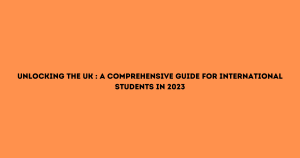Step-by-Step Guide to Studying Overseas:From Research to Settling In
Studying overseas can be an exciting and rewarding experience. It offers you the opportunity to explore a new country, immerse yourself in a different culture, and gain a global perspective on your education. Here is a step-by-step guide to help you navigate the process of studying overseas:
Research your options:
– Start by researching different countries and their education systems. Consider factors such as the quality of education, reputation of universities, and their rankings in your field of study.
– Look into the cost of living, as it can vary significantly from country to country.
– Research available scholarships and financial aid options for international students.
– Consider the cultural aspects of each country and how comfortable you would be living there.
Choose a destination:
– Based on your research, narrow down your options and choose a destination that aligns with your academic and personal goals.
– Consider factors such as language spoken, climate, safety, and proximity to home.
– Think about the opportunities the country offers in terms of internships, job prospects, or research collaborations in your field.
Select a university/program:
– Explore the universities or colleges available in your chosen destination.
– Consider their academic reputation, rankings, and accreditation.
– Look into the specific programs or majors they offer, ensuring they align with your academic interests and career goals.
– Consider factors such as faculty expertise, research opportunities, and access to resources and facilities.
. Check admission requirements:
– Review the admission requirements for international students at your chosen universities.
– Pay attention to the specific academic prerequisites, such as GPA requirements or subject prerequisites.
– Check if you need to take any standardized tests like TOEFL, IELTS, SAT, GRE, or GMAT and prepare accordingly.
– Take note of the required supporting documents, such as transcripts, letters of recommendation, statement of purpose, and resume/CV.
Prepare your application:
– Start preparing your application well in advance, ensuring that you meet the application deadlines.
– Gather all the required documents, such as academic transcripts, test scores, letters of recommendation, and your statement of purpose.
– If needed, have your documents translated or evaluated by authorized organizations.
– Pay attention to formatting and presentation, ensuring that your application is clear, concise, and free of errors.
Financing your education:
– Research the cost of tuition, living expenses, and healthcare coverage in your chosen destination.
– Explore scholarships, grants, and financial aid opportunities specifically available to international students.
– Check if the university offers any scholarships or bursaries for international students.
– Look into external funding sources, such as government scholarships or private organizations.
Apply for scholarships:
– Research scholarship opportunities for international students and carefully read the eligibility criteria and application guidelines.
– Prepare the necessary documents, such as essays, personal statements, or financial statements, required for each scholarship.
– Pay attention to deadlines and submit your scholarship applications well in advance.
Apply for a student visa:
– Once you receive an acceptance letter from your chosen university, research the visa requirements for your destination country.
– Prepare the necessary documents, such as proof of acceptance, financial statements, health insurance, and a valid passport.
– Follow the visa application process of the country and submit your application within the specified timeframe.
– If required, schedule an appointment at the nearest embassy or consulate.
Plan your accommodation:
– Research the available accommodation options for international students in your chosen destination.
– Consider factors such as cost, location, safety, and amenities.
– Explore options such as on-campus dormitories, off-campus housing, or homestays.
– Start making arrangements for your accommodation well in advance to secure a suitable place to live.
Prepare for the move:
– Make a checklist of tasks you need to complete before your departure, including arranging travel arrangements and booking flights.
– Obtain travel insurance to ensure you are covered during your journey and stay abroad.
– Gather all necessary documents, such as your passport, student visa, acceptance letter, and financial records.
– Pack your belongings, taking into account any specific climate considerations or cultural norms in your destination country.
– Inform the relevant authorities in your home country about your temporary move, such as your school, bank, or government agencies.
Attend orientation:
– Once you arrive at your destination, attend the orientation program provided by your university.
– This will help you become familiar with the campus, academic resources, support services, and the local area.
– Take advantage of any sessions or workshops offered to international students, which can provide valuable information and help you adapt to the new environment.
Settle in and explore:
– Take some time to settle into your new environment.
– Familiarize yourself with the local culture, customs, and norms.
– Explore the city or town where your university is located, visiting landmarks, trying local cuisine, and getting to know the surroundings.
– Make connections with fellow international students and local students by joining student clubs, organizations, or extracurricular activities.
– Engage in cultural exchange activities to enhance your understanding of the local community.
Remember to stay organized throughout the entire process, seek guidance from your university’s international office or advisors, and keep an open mind to embrace the new experiences and opportunities that studying overseas will bring.










